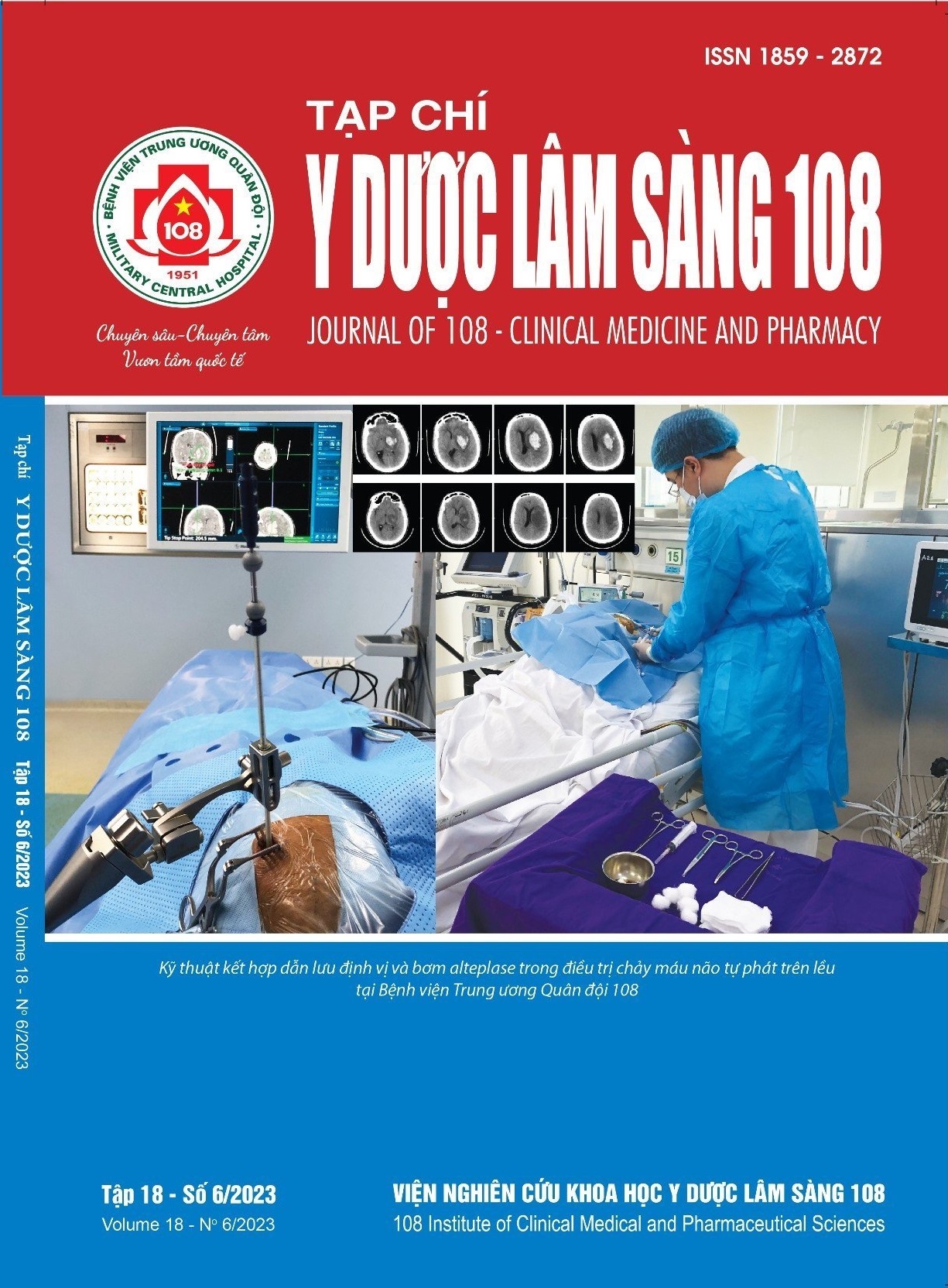Giá trị của thang điểm Oakland trong tiên lượng xuất huyết tiêu hóa dưới
Main Article Content
Keywords
Tóm tắt
Mục tiêu: Xác định giá trị của thang điểm Oakland trong tiên lượng khả năng truyền máu, xuất huyết tái phát ở bệnh nhân xuất huyết tiêu hóa dưới. So sánh thang điểm Oakland với thang điểm Birmingham, thang điểm SHAPE trong tiên lượng truyền máu, xuất huyết tái phát. Đối tượng và phương pháp: Nghiên cứu mô tả cắt ngang, tiến cứu và hồi cứu khảo sát các bệnh nhân bị xuất huyết tiêu hóa dưới cấp nhập vào Khoa Tiêu hóa, Bệnh viện Đại học Y Dược TP. Hồ Chí Minh từ ngày 01/5/2019 đến ngày 30/5/2021. Tính điểm số các thang điểm Oakland, thang điểm Birmingham, thang điểm SHAPE và so sánh diện tích dưới đường cong ROC (AUC) để xác định giá trị dự đoán của các thang điểm. Kết quả: Có 79 bệnh nhân xuất huyết tiêu hóa dưới đủ tiêu chuẩn được khảo sát, tuổi trung bình: 61,89 ± 16,26, tỉ lệ nam và nữ tương đương nhau, tỉ lệ xuất huyết tái phát trong bệnh viện: 5%, tỉ lệ tử vong trong bệnh viện: 1,3%, tỉ lệ cần truyền máu: 30,4%. Về nguy cơ xuất huyết tái phát: Thang điểm Oakland (AUC = 0,84) có giá trị tiên lượng tốt hơn thang điểm Birmingham (AUC = 0,79) và thang điểm SHAPE (AUC = 0,74). Về nguy cơ truyền máu: Thang điểm Oakland (AUC = 0,97) có giá trị tiên lượng tương đương thang điểm Birmingham (AUC = 0,95) và thang điểm SHAPE (0,94). Kết luận: Thang điểm Oakland có giá trị trong tiên lượng kết cục lâm sàng ở bệnh nhân xuất huyết tiêu hóa dưới và có thể áp dụng rộng rãi trong thực hành lâm sàng, đặc biệt trong tiên lượng nguy cơ cần truyền máu.
Article Details
Các tài liệu tham khảo
2. Lanas A, García-Rodríguez LA, Polo-Tomás M et al (2009) Time trends and impact of upper and lower gastrointestinal bleeding and perforation in clinical practice. Am J Gastroenterol 104(7): 1633-1641.
3. Strate LL, Ayanian JZ, Kotler G et al (2008) Risk factors for mortality in lower intestinal bleeding. Clin Gastroenterol Hepatol 6(9): 1004-1010.
4. Diamantopoulou G, Konstantakis C, Kottorοu A, et al (2017) Acute Lower Gastrointestinal bleeding: characteristics and clinical outcome of patients treated with an intensive protocol. Gastroenterology Res 10(6): 352-358.
5. Oakland K, Jairath V, Uberoi R et al (2017) Derivation and validation of a novel risk score for safe discharge after acute lower gastrointestinal bleeding: A modelling study. Lancet Gastroenterol Hepatol 2(9): 635-643.
6. Oakland K, Chadwick G, East JE, Guy R, Humphries A, Jairath V, McPherson S, Metzner M, Morris AJ, Murphy MF, Tham T, Uberoi R, Veitch AM, Wheeler J, Regan C, Hoare J (2019) Diagnosis and management of acute lower gastrointestinal bleeding: guidelines from the British Society of Gastroenterology. Gut 68(5): 776-789.
7. Quach DT, Nguyen NTM, Vo UPP et al (2020) Development and validation of a scoring system to predict severe acute lower gastrointestinal bleeding in Vietnamese. Digestive Diseases and Sciences 66(3): 823-831.
8. Oakland K, Guy R, Uberoi R et al (2018) Acute lower GI bleeding in the UK: patient characteristics, interventions and outcomes in the first nationwide audit. Gut 67(4): 654-662.
9. Aoki T, Nagata N, Niikura R et al (2015) Recurrence and mortality among patients hospitalized for acute lower gastrointestinal bleeding. Clin Gastroenterol Hepatol 13(3): 488-494.
10. Ng KS, Nassar N, Soares D et al (2017) Acute lower gastrointestinal haemorrhage: Outcomes and risk factors for intervention in 949 emergency cases. Int J Colorectal Dis 32(9): 1327-1335.
11. Nguyễn Thị Mỹ Nguyệt (2018) Các yếu tố nguy cơ của xuất huyết tiêu hóa dưới mức độ nặng. Luận văn tốt nghiệp (Bác sĩ Nội trú ), Đại học Y Dược Thành phố Hồ Chí Minh, Hồ Chí Minh.
12. Aoki T, Yamada A, Nagata N et al (2018) External validation of the NOBLADS score, a risk scoring system for severe acute lower gastrointestinal bleeding. PLoS One 13(4): 0196514.
13. Hreinsson JP, Sigurdardottir R, Lund SH et al (2018) The SHA(2)PE score: A new score for lower gastrointestinal bleeding that predicts low-risk of hospital-based intervention. Scand J Gastroenterol 53(12): 1484-1489.
14. Oakland K, Kothiwale S, Forehand T et al (2020) External validation of the oakland score to assess safe hospital discharge among adult patients with acute lower gastrointestinal bleeding in the US. JAMA Netw Open 3(7): 209630.
 ISSN: 1859 - 2872
ISSN: 1859 - 2872
